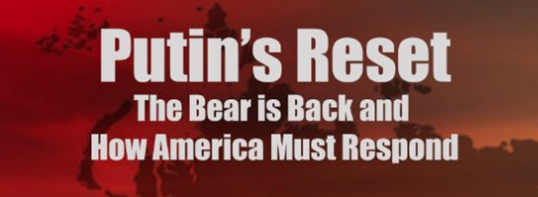“Russia’s New Information War: What It’s Like and What to Do About It,” by J. Michael Waller, Ph.D., in Fred Fleitz, ed., Putin’s Reset: The Bear Is Back and How America Must Respond (Washington: Center for Security Policy, 2016), is a policy essay that examines Moscow’s information and propaganda warfare against the West, with a list of policy options.
The full volume examines the Russian strategic threat to American interests across the entire spectrum of conflict.
Waller’s piece, published in November, 2016, joins policy essays by Fred Fleitz, Stephen Blank, Mark B. Schneider, Daniel Gouré, Kevin Freeman, David Satter, Roger W. Robinson Jr., and Cliff Kincaid. It is substantially edited from the original, causing lack of proper footnotes and other citations. The original draft, with full sourcing, is available here.
Extract from Dr. Waller’s introduction
Russia’s new information war is a logical outgrowth of the way Vladimir Putin engineered his rise to power. As the security minister and designated successor to the ailing and alcoholic President Boris Yeltsin in 1999, Putin engineered the bombings of apartment buildings in southern Russia and blamed the slaughter on Chechen rebels. His “propaganda by deed” provided the pretext to launch a new war to smash the Chechen rebellion. Both created the mass outrage that called for strong and decisive leadership, manufacturing and focusing public demand his quiet ouster of Yeltsin on the night of Y2K.
Seen through that lens, the Kremlin’s weaponization of information is a logical, proven, cost-effective means of domestic political action, internal security, and international power projection. It succeeds because neither the Russian public nor the West demanded a public accounting of Russia’s Communist past the role of the former KGB as the sword and shield of the Soviet state. Both were willing to suspend their belief for their own purposes.
Inaction from three successive American presidents empowered Putin and unwittingly gave the otherwise weak Russia an enormous capability to wage war, sometimes without firing a shot. Information, properly applied, gives leverage to the materially weaker side. The Kremlin’s new information warfare and propaganda capabilities, while innovative for a government, merit concern mostly because of the West’s flaccid and delayed response.
The capabilities and actions present a strategic challenge. With the grave but unsurprising exception of subversion of the U.S. political system, they hardly merit the breathless reportage and commentary from many political observers, because they have been building up visibly for more than a decade.
Putin’s unnecessarily aggressive info-centric actions give the U.S. and its partners the pretext to exploit the potentially profound vulnerabilities of the secret-police regime, and the fragilities that, if exploited, could widen many existing splits within the Putin leadership itself and the Russian Federation at large.
All this, of course, lowers the threshold of conflict to the level of classical espionage, propaganda, and subversion, at which the Kremlin has excelled for the past century, with a modern digital twist. The U.S. and its allies generally have opted not to engage, out of the quaint “gentlemen don’t read other people’s mail” principle, or more likely, simple ignorance about what to do or how. After a long period of not wanting to see, the West finds itself surprised and alarmed at being on the receiving end of what historically is a simple and manageable method of statecraft.
The editing process pulled out substantial amounts of text, including quotations and sourcing. Order a published electronic or printed version on Amazon, or download a PDF here: putins_reset
Summary from the Center for Security Policy
Putin’s Reset: The Bear is Back and How America Must Respond explores the threats posed by Putin’s Russia, many of which have received little attention in the U.S. press. These include significant improvements in Russia’s nuclear ballistic missile arsenals, drastically improved air and missile defenses, and hardened shelters against nuclear attacks, apparently in preparation to survive a nuclear war. Russia also has stepped up economic, cyber, information and intelligence warfare against the United States to undermine American security and create a new global order.
